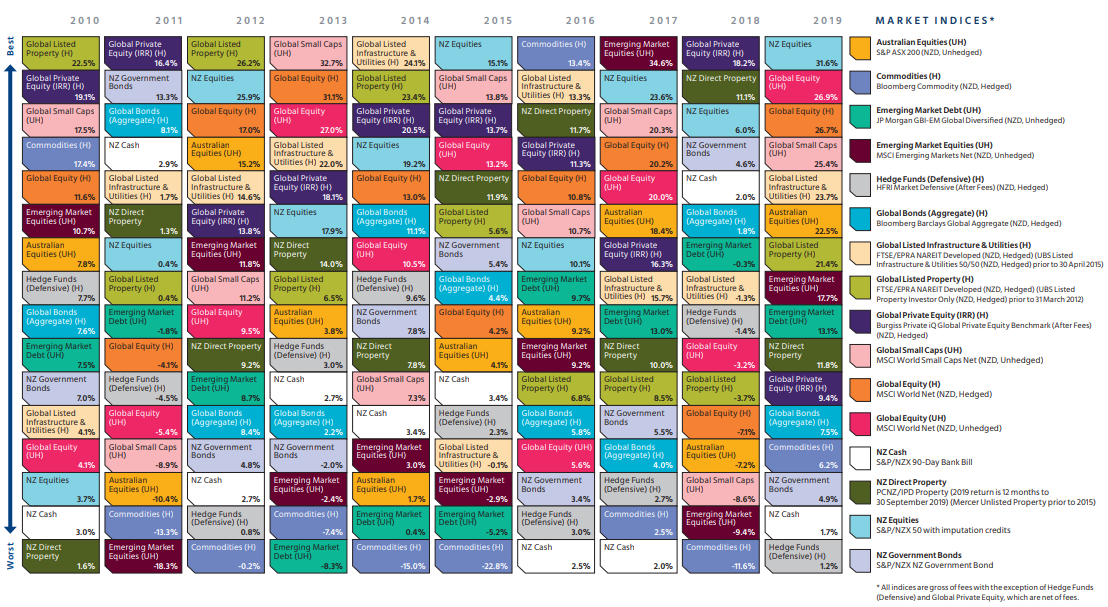Investors Benefit from 2019's Bumper Market Bounce
MERCER NEW ZEALAND
The investment universe is made up of various asset classes. In order to pursue desired portfolio outcomes over time, the goal is to allocate to a selection of these components while bearing in mind the associated risks. Mercer produces a Periodic table of investment returns each year. David Scobie, Mercer’s Head of Investment Consulting, has explained the colour-coded table which summarises 16 major asset classes and ranks how each as performed, on an annual basis, over the last 10 years.

A glance at the Table, with its scattered array of shades, quickly highlights how challenging it is to unearth patterns and predict what the years ahead may hold. Last year’s stars at times shine again the next year, and at other times fade out to occupy the bottom ranks.
Looking across the past decade, a number of observations can be made:
- 2019 proved to be a very strong year for financial markets. Every investment sector depicted generated a positive return - not normally a common event but the third time this has happened in the last four years. 2018 provides a contrast when 10 out of the 16 asset classes delivered a negative return.
- Share markets across the world were buoyant in 2019 and New Zealand Equities topped the table with an exceptional 32% return. Companies such as Fisher and Paykel Healthcare, Restaurant Brands and Port of Tauranga led the way. A low interest rate environment and a relatively robust economy underpinned the strength of our market, which has now bettered our Australian counterpart for nine years running.
- Both New Zealand and Global Fixed Interest delivered solid single digit returns last year alongside a general fall in interest rates – adding to the number of offshore bonds trading at negative yields. While they couldn’t compete with the riskier asset classes, bonds gave a helpful boost for conservative investors.
- Further down the Table, Cash and defensively-oriented Hedge Funds delivered modest returns in 2019. Both have been regular inhabitants of the lower half of the Table over the past decade. The same can be said of Commodities which, hampered by a low inflationary environment, produced a negative return in six out of the last 10 years.
- The biggest asset class bounce last year was Global Small Cap Equities, recovering from a -9% return in 2018 to generate +25% in 2019. Certainly a lesson in volatility for investors in that sector.
- There were few sizeable falls from grace in 2019. Having taken first ranking in 2018, Global Private Equity drifted down the rankings. However, to put this in context, the asset class has placed in the top half of the Table an impressive nine times over the past decade, benefiting those investors with tolerance for some illiquidity.
- Across the decade, the award for single highest annual return goes to Emerging Market Equities (+35% in 2017). The sector also had the second-to-worst year with a -18% return in 2011, under-cut only by Commodities in 2015.
- Overall, last year’s asset class returns were grouped within a 30% top-to-bottom range - similar to the prior two years’ and to the average for the decade as a whole.
Diversified funds, including those offered via savings plans (such as KiwiSaver), tend to have exposure to a collection of the asset classes contained in the Periodic Table. Being well-exposed to growth assets was the recipe for high returns in 2019, but even those investors with relatively conservative portfolios should have had a pleasing year.
We can never tell with a high degree of confidence what the future will hold for financial markets. Their inherent volatility continues to be a reminder of the merits of asset class diversification. For many investors, a key takeaway is the importance of harnessing both time and patience - the big money to be made is often not in the buying and selling but in the waiting.
David Scobie is Head of Consulting at Mercer Investments, based in Auckland.
This article does not contain investment advice relating to your particular circumstances. No investment decision should be made based on this information without first obtaining appropriate professional advice and considering your circumstances.
|
Head of Investment Consulting |
David Scobie Head of Investment Consulting David Scobie is Mercer's Head of Investment Consulting in the Institutional Wealth business. He is actively involved in assisting clients with their investment strategy, portfolio construction and implementation. David is also involved in evaluating fund managers, linking in with Mercer's research capability in Australia and globally.
|


